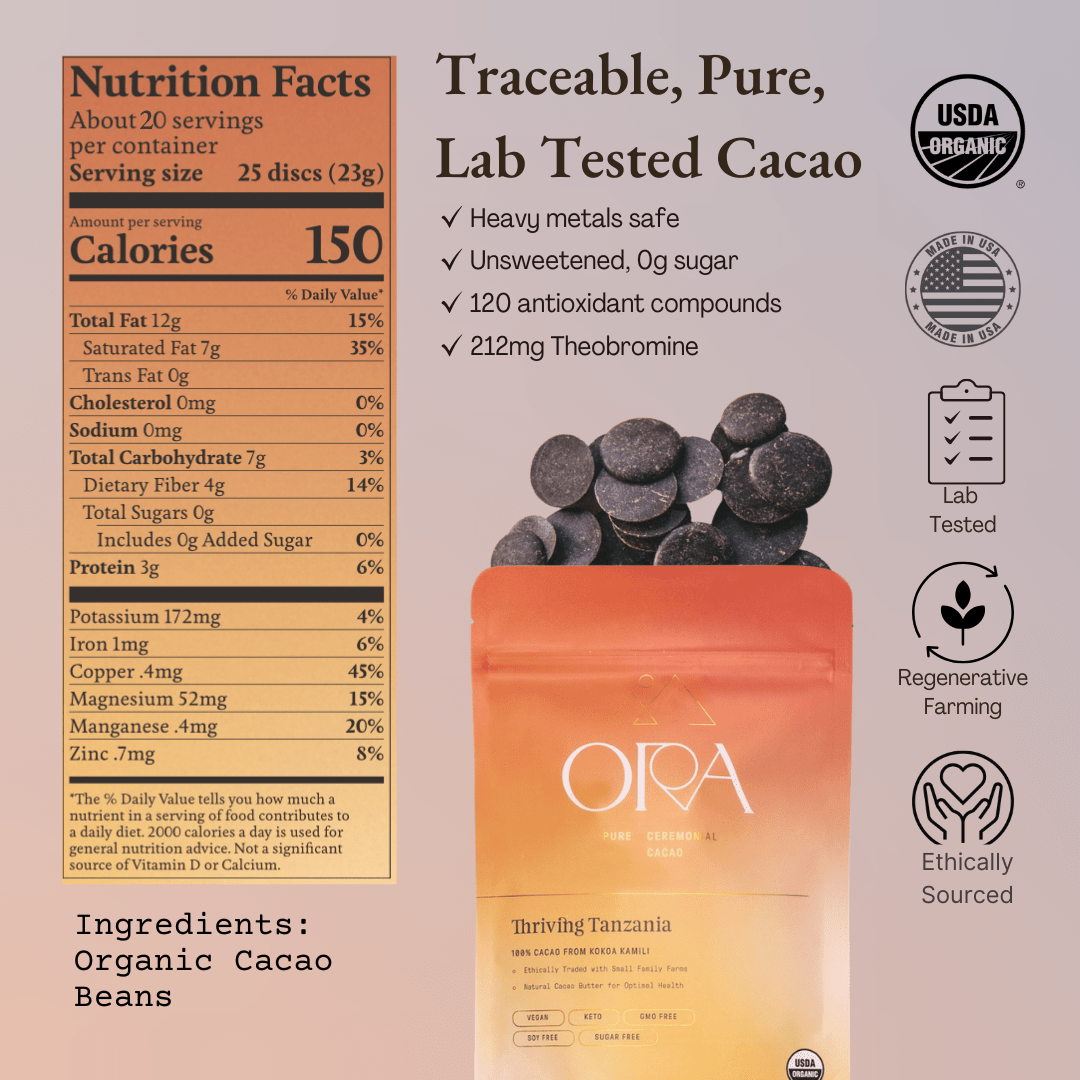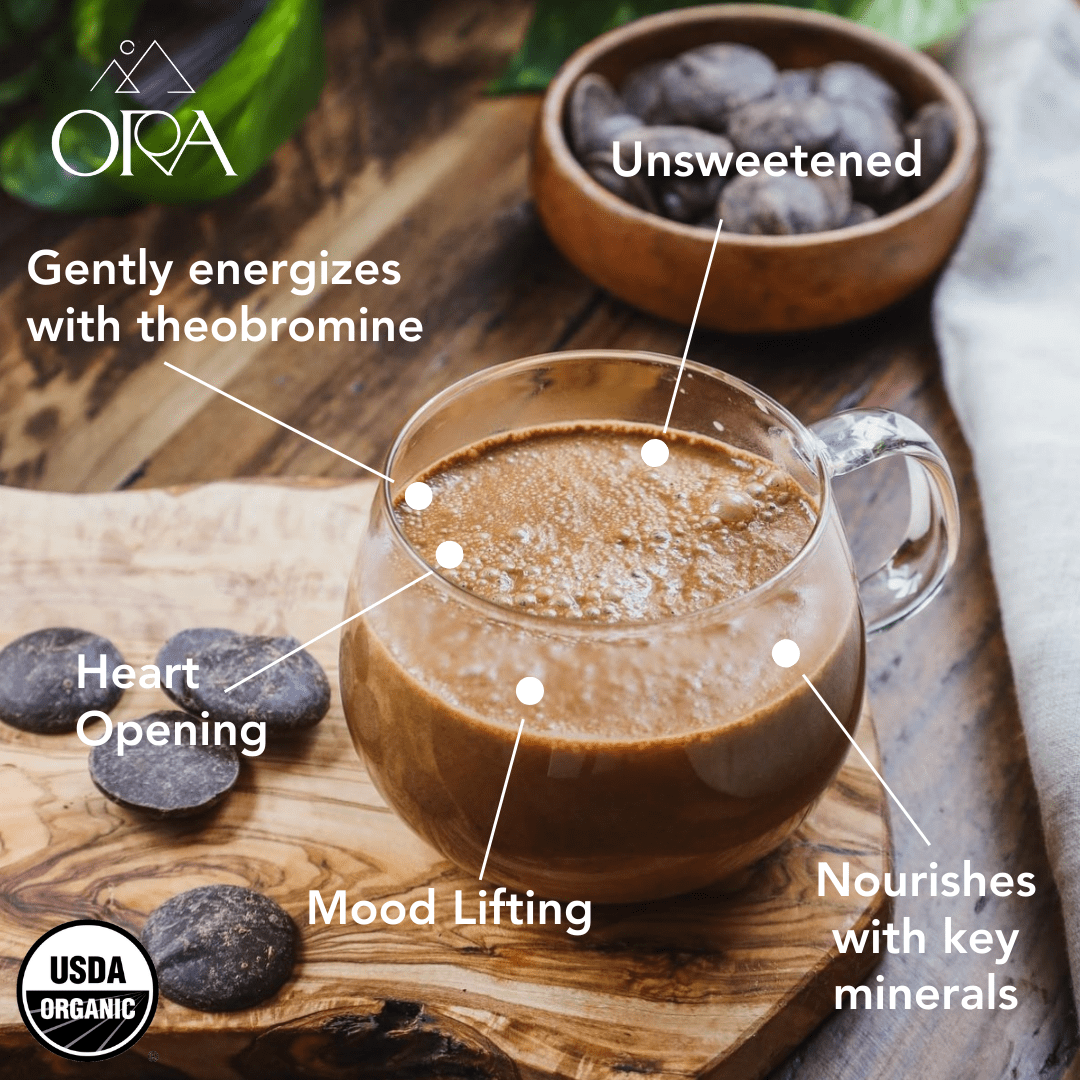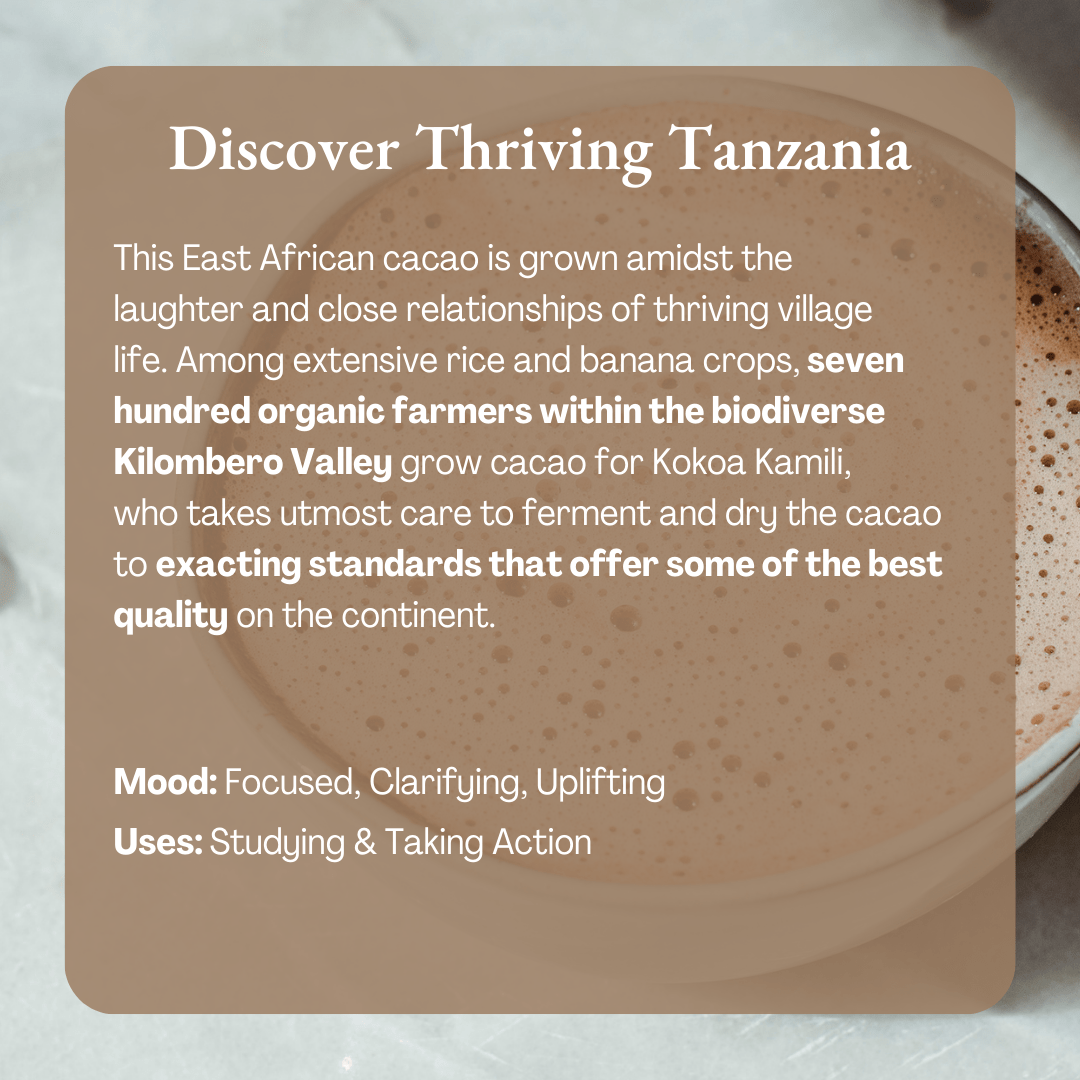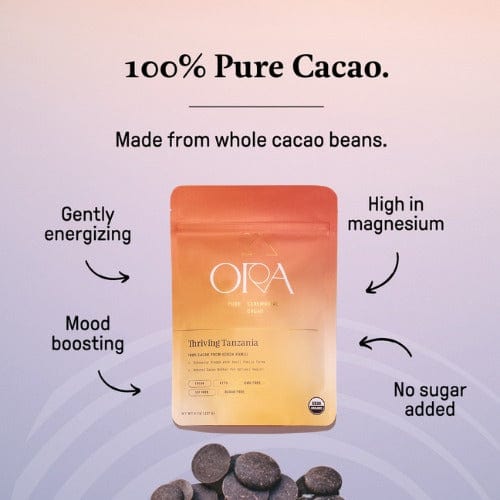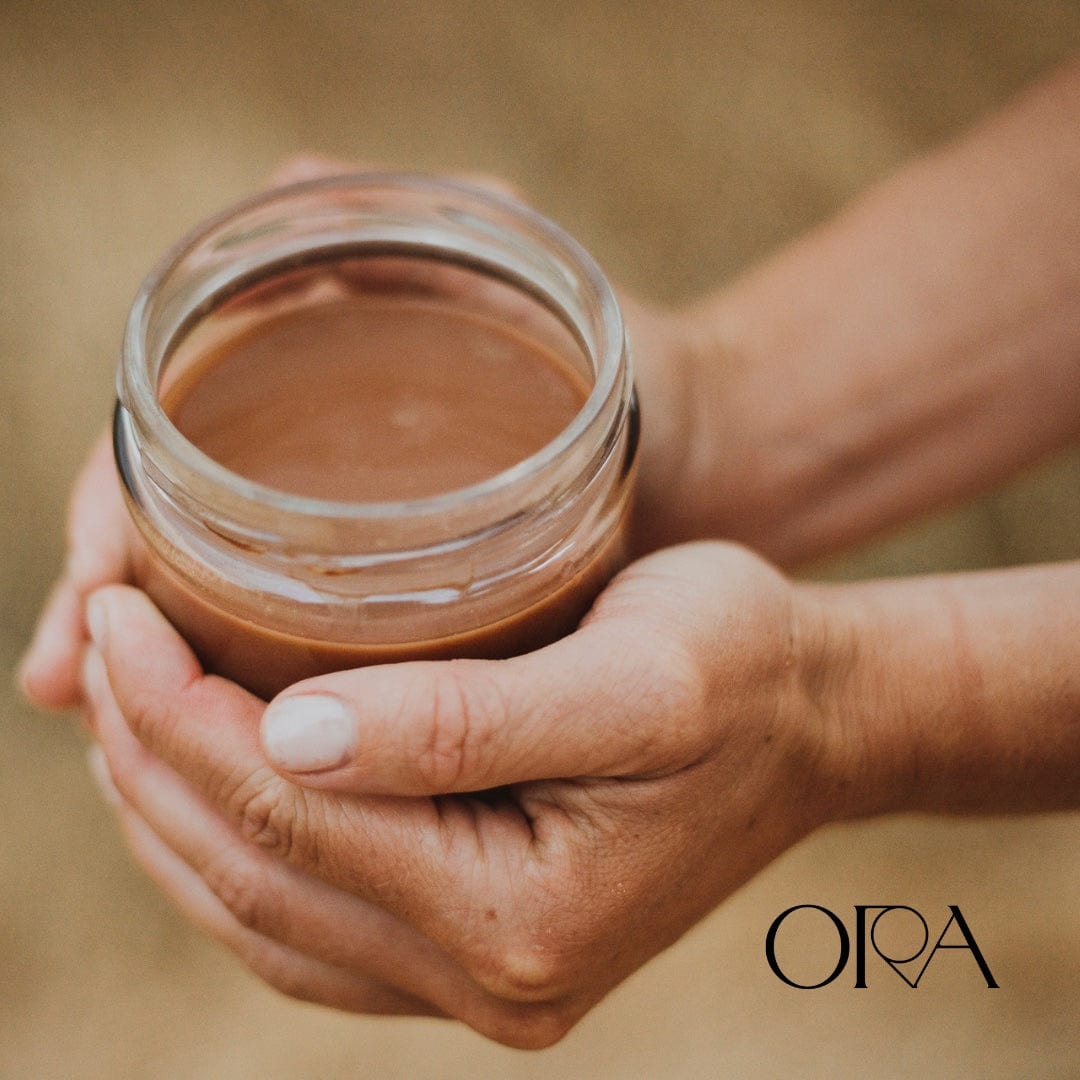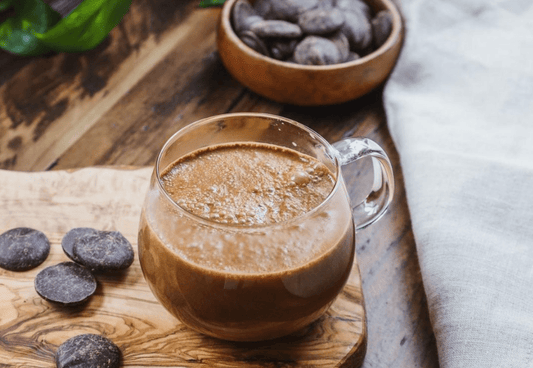Pure 100% Organic Ceremonial Cacao
Thriving Tanzania
Couldn't load pickup availability
Organic & Regenerative
Lab-Tested
This pure 100% cacao is grown amidst the laughter and close relationships of thriving village life in Africa. Amidst extensive rice and banana crops, seven hundred certified organic farmers within the biodiverse Kilombero Valley grow cacao for Kokoa Kamili, who takes utmost care to ferment and dry the cacao to exacting standards ...
This pure 100% cacao is grown amidst the laughter and close relationships of thriving village life in Africa. Amidst extensive rice and banana crops, seven hundred certified organic farmers within the biodiverse Kilombero Valley grow cacao for Kokoa Kamili, who takes utmost care to ferment and dry the cacao to exacting standards that offer the best quality on the continent. From our farmers in Tanzania, "Asante" - this is Swahili for thank you!
This ceremonial cacao comes from 700 small (0.5-2 acre) organic family farms in the Kilombero Valley, which borders Udzungwa Mountains National Park, a spot known for its biodiversity. Our partners here are Kokoa Kamili (Quality Cacao in Swahili), and their model is inspired by our partners in Belize. In its first three years, Kokoa Kamili farmers have received the highest prices for cacao in Tanzania. The cacao from this region is exceptional as a pure dark chocolate as it has a higher cacao butter content than average, resulting in a silky smoothness.
Read more about how the cacao is grown and see photos from our Tanzania trip here.
Why You'll Love This
Why You'll Love This
UPLIFT - Neuromodulators and neuro reuptake-inhibitors in cacao support a stable and elevated mood that lasts.
ENERGIZE - Theobromine gently energizes and helps with coffee reduction or replacement.
NOURISH - High mineral density in cacao replenishes deficiencies so you can be optimally healthy
INSPIRE - Cacao ceremony begins with mindfulness, gratitude, and intention. Practice at home to deepen your relationship.
Certifications & Lab Test Results
Certifications & Lab Test Results
1. Organic & Regenerative - all of our cacao is certified organic by Organic Certifiers. We only source from farms practicing regenerative agroforestry.
2. Heavy Metals - we lab test all of our cacao. You can see our test results here.
3. Caffeine & Theobromine - our pure cacaos contain 36mg of caffeine and 212mg of Theobromine. Ceremonial cacao is a great coffee replacement because it offers a grounded energy boost without the jitters and crash (the caffeine is substantially down-regulated by other compounds in cacao).
4. Vegan, Keto, Kosher - Kosher certified by Earth Kosher.
5. Unsweetened - no sugar or sweeteners of any sort.
Ingredients + Nutrition Facts
Ingredients + Nutrition Facts
Ingredients: Organic Cacao Beans from Tanzania. That's all! No sweeteners.

Cacao Sourcing Standard
Cacao Sourcing Standard
Ceremonial Cacao refers to a premium grade, pure cacao that is ethically sourced from small family farms practicing regenerative agroforestry. Ceremonial cacao is made from a single ingredient, whole cacao beans, with nothing added or removed. You drinking cacao with intention and gratitude is part of it too!
100% Cacao from Kokoa Kamili in Kilombero Valley Read more
How To Prepare Cacao
How To Prepare Cacao
Step 1 - Combine between 20 cacao discs (0.8oz) to 25 cacao discs (1.0oz) with a touch of sweetener (or drink pure)
Step 2 - Add 3/4 cup (6oz) hot water, tea, or mylk ~ 180°F
Step 3 - Use a blender or electric frother to mix for 10 seconds. This creates much better texture than just stirring.
SERVING SIZE
SERVING SIZE
For daily use, we recommend about 1oz of cacao or 20-25 discs per serving. It is safe to have two servings per day.
If you tend to be more sensitive (or if you're on SSRIs), start small with 5-10 discs first and see how you feel before increasing to 25 discs.
It is possible to enjoy a few discs of cacao at a time by letting them melt on your tongue instead of blending them into a drink.
To receive the health benefits, minerals, energizing effect, and mood lift, we do recommend the standard ~25 discs serving size.

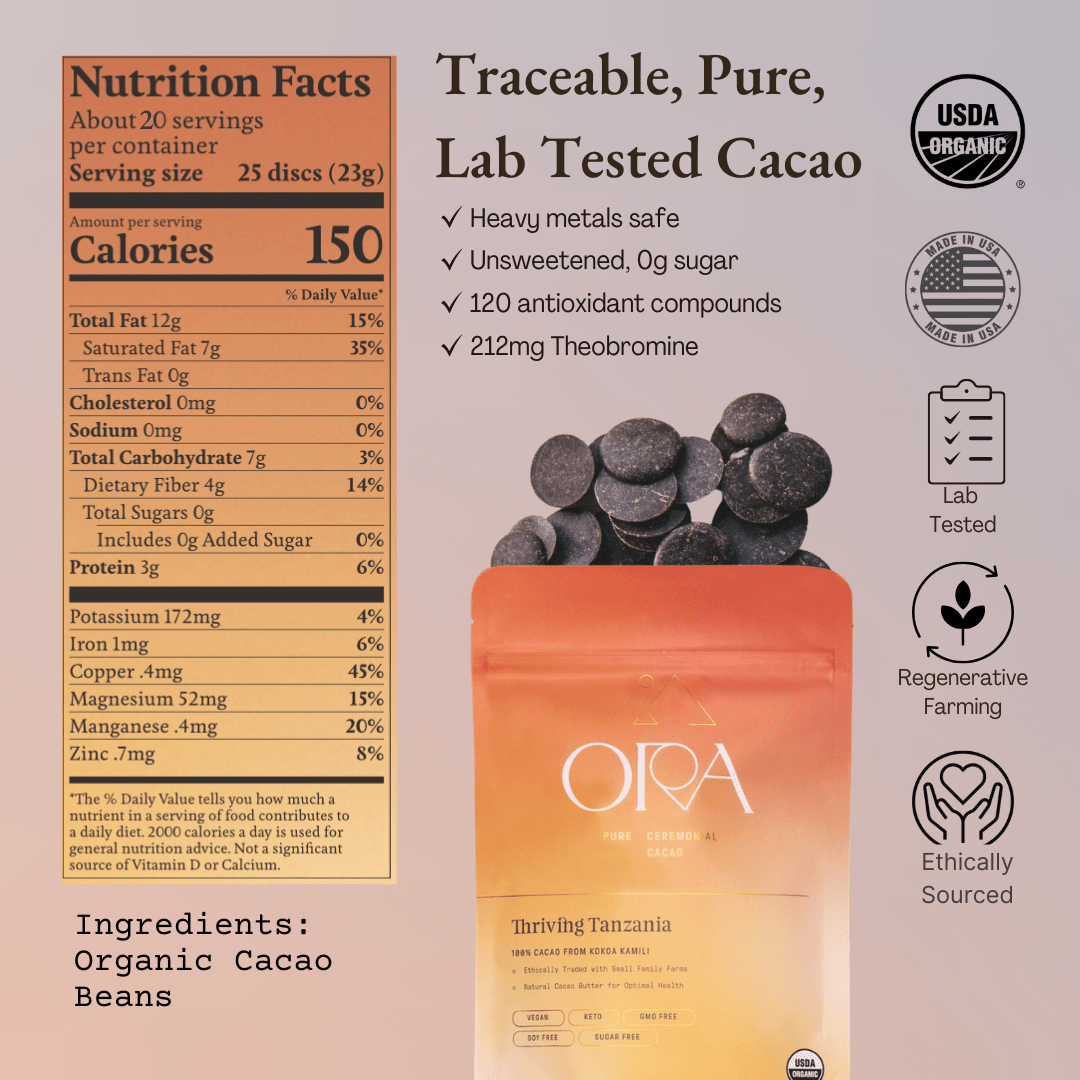
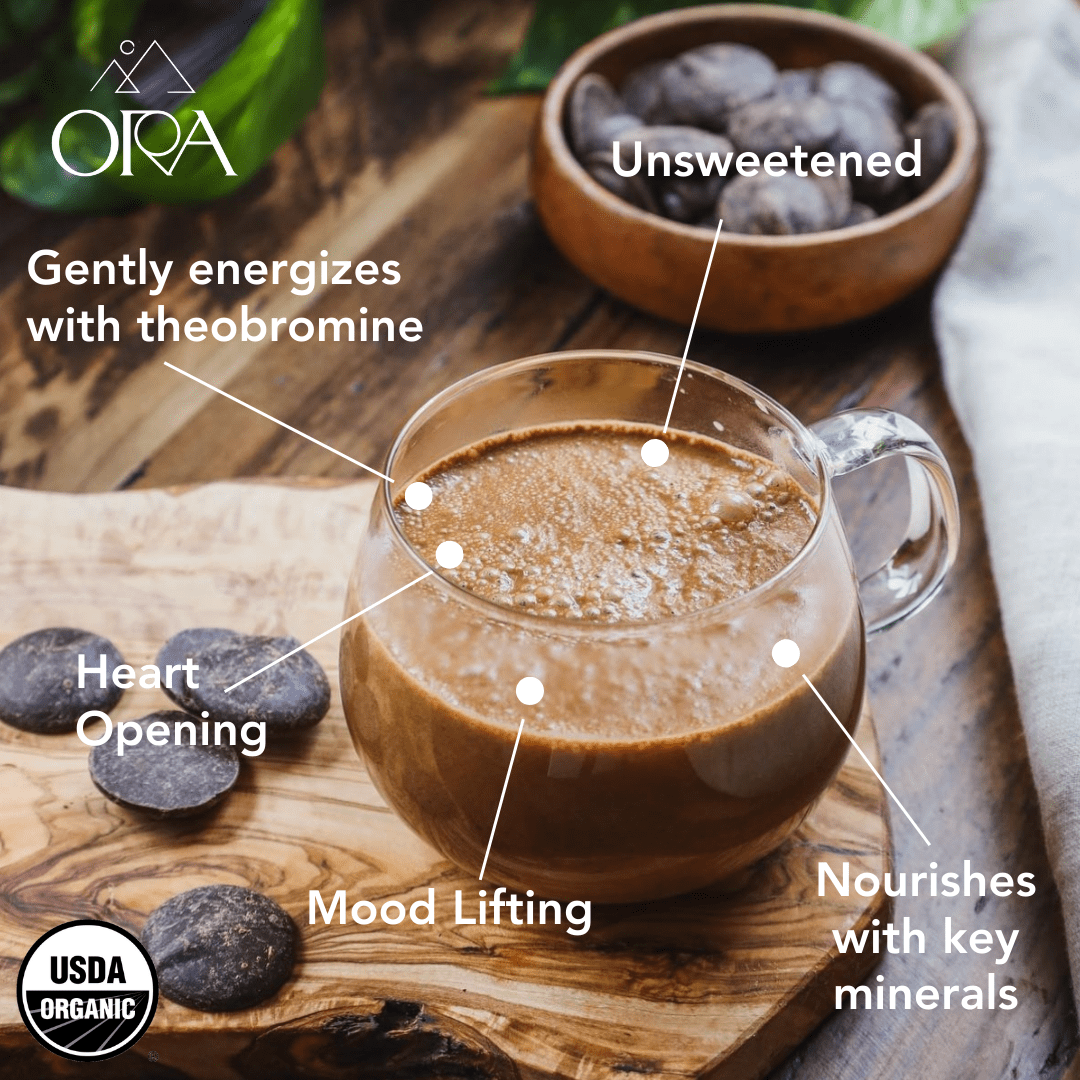
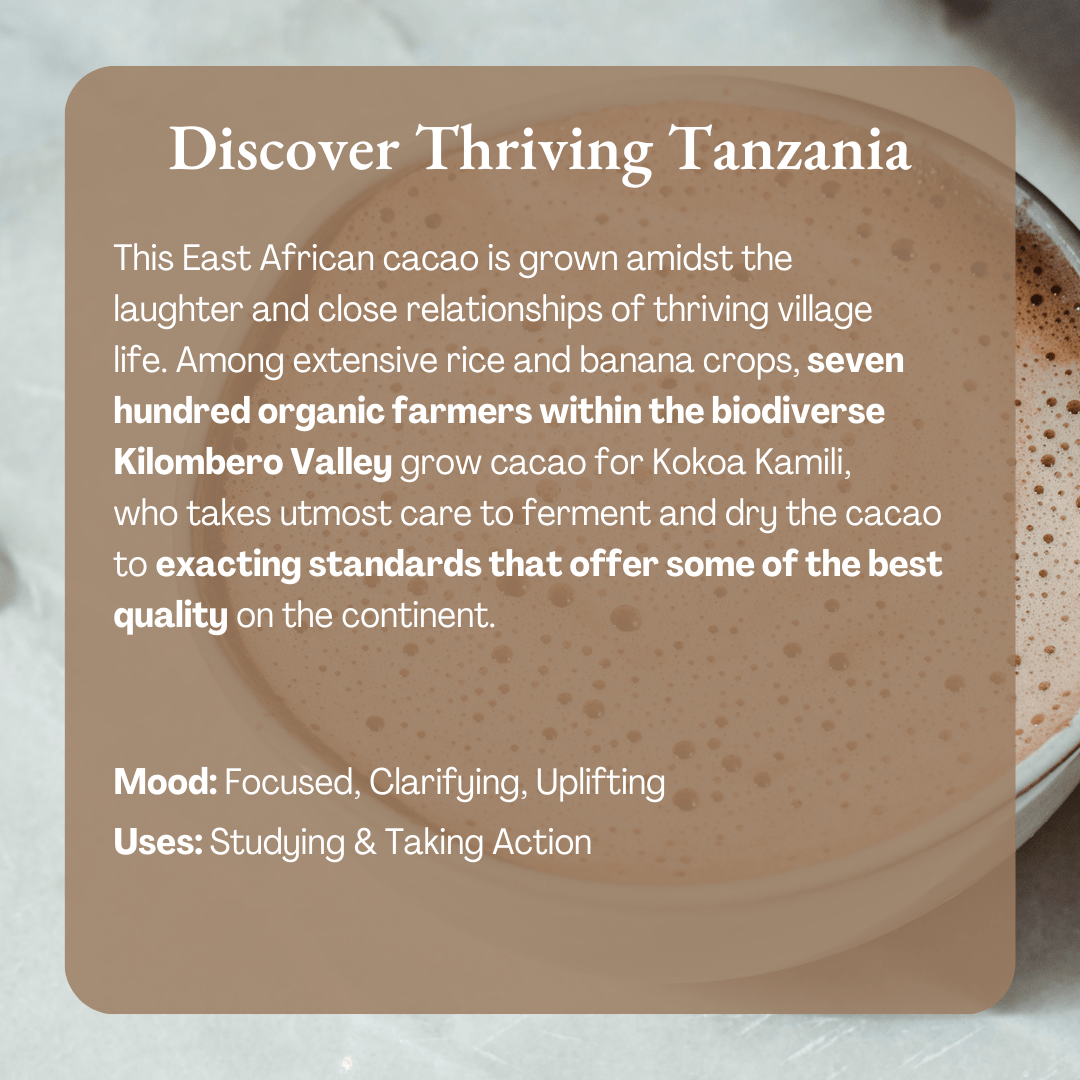
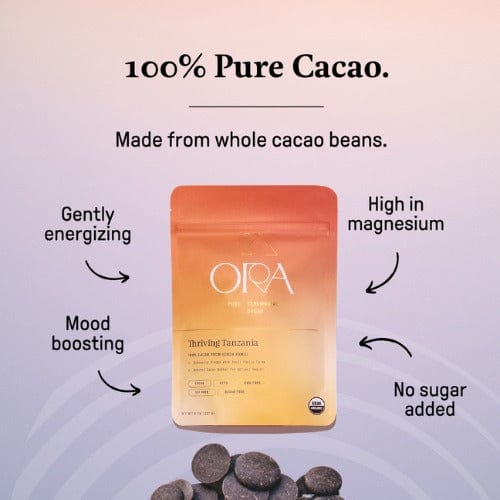
Ethical Trade Regenerative Agroforestry USDA Organic Unsweetened Third Party Lab Tested Metals Safe High in Flavonoids Vegan & Keto Kosher GMO-Free & Soy-Free
Ethical Trade Regenerative Agroforestry USDA Organic Unsweetened Third Party Lab Tested Metals Safe High in Flavonoids Vegan & Keto Kosher GMO-Free & Soy-Free
3 Reasons Why 1 Million Cups Of Ora Cacao Are Sipped Each Year
-
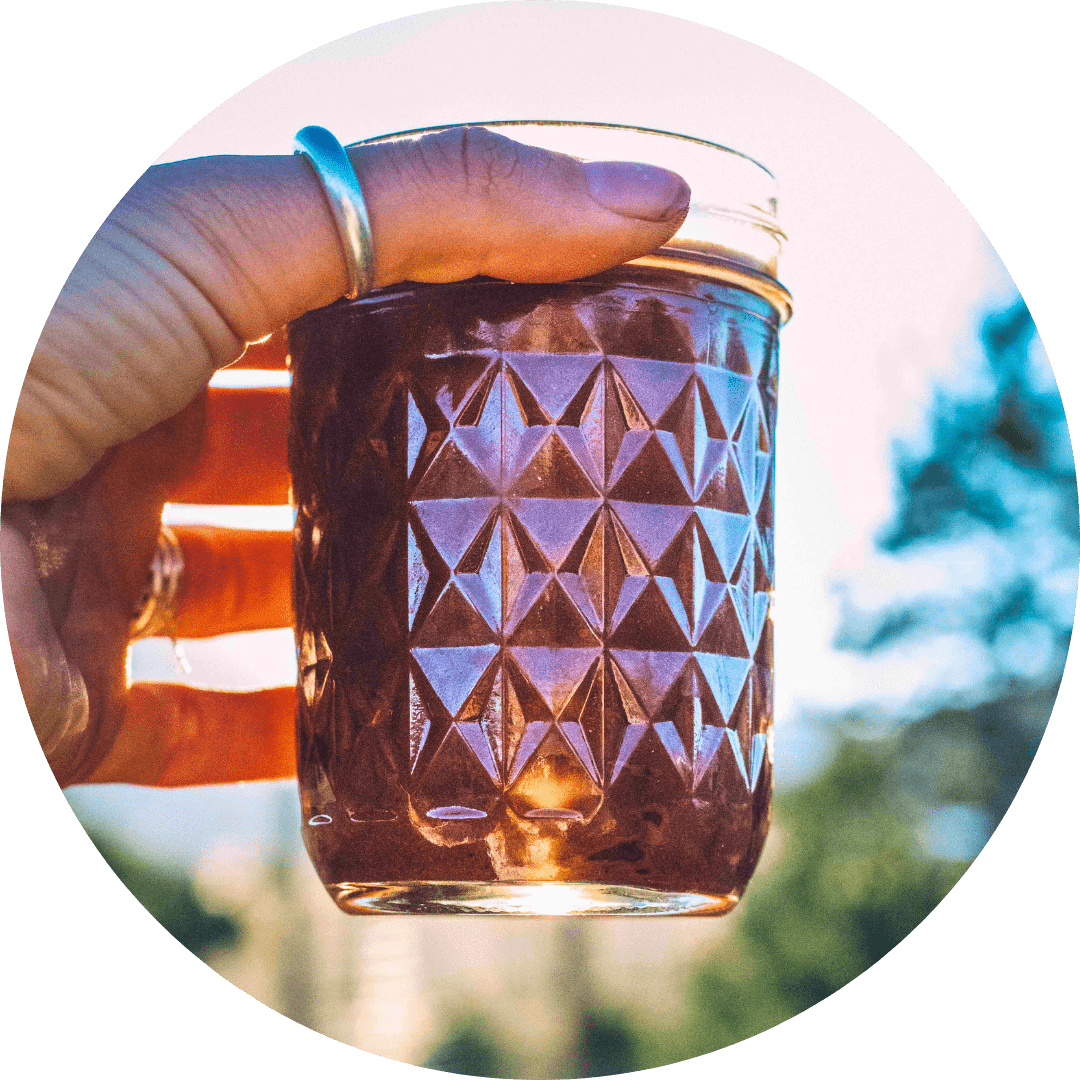
1) Gently Energizing
Cacao energizes with theobromine instead of caffeine. Theobromine relaxes your blood vessels, increases circulation, supports heart health, and promotes nutrient absorption. Enjoy steady, uplifting energy without the jitters or crash of coffee.
-
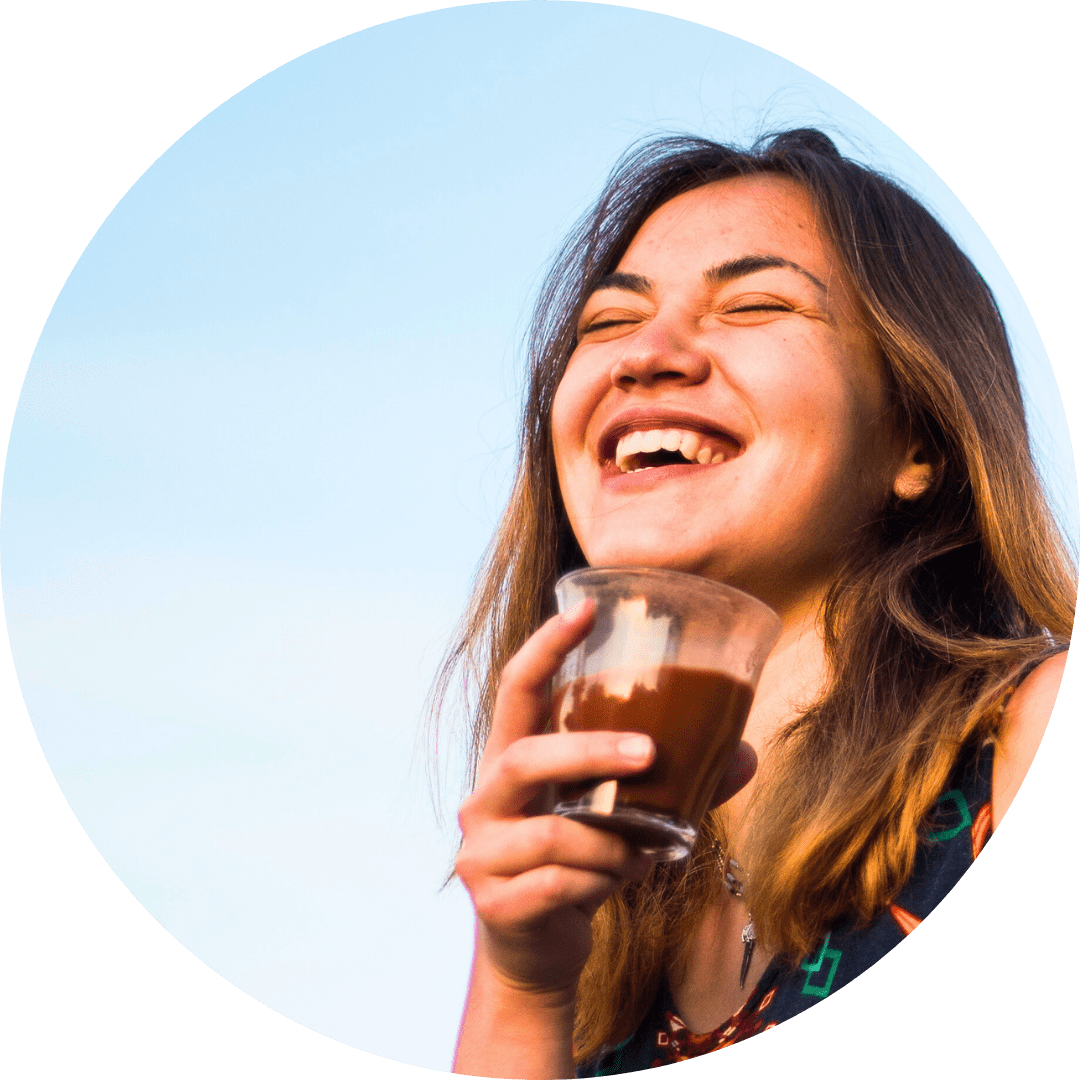
2) Mood Boosting
Cacao's neuromodulators and reuptake inhibitors help boost and stabilize your mood. Drinking ceremonial cacao can make you feel blissful, connected, inspired, grounded,and may even release stuck emotions or energy, giving a sense of time slowing down.
-
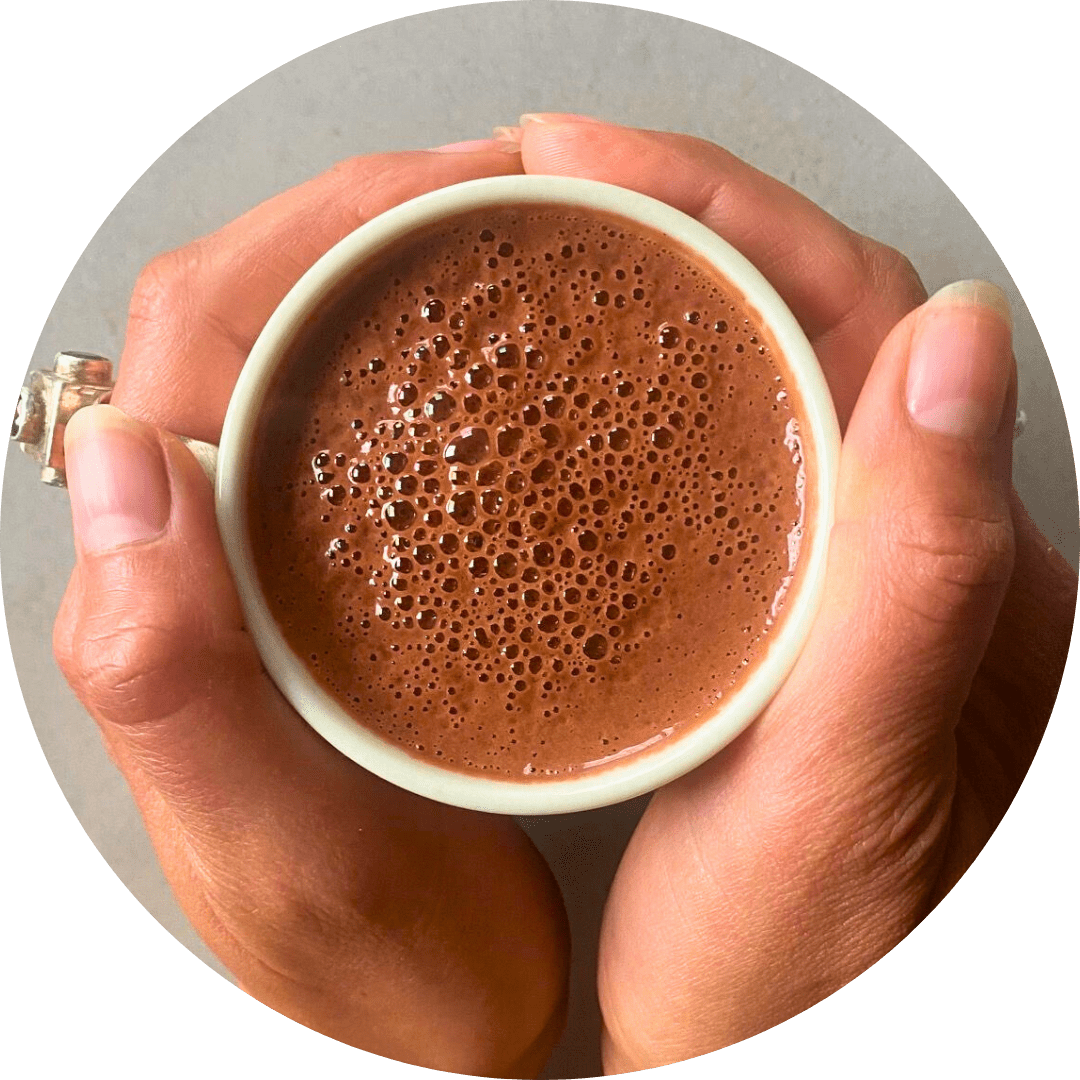
3) Nourishing
Cacao replenishes essential minerals, especially magnesium, which is often lacking in Western diets.Magnesium supports brain function, memory, concentration, and heart health. Cacao is also rich in chromium, copper, calcium, manganese, zinc, sulfur, iron, and phosphorus.
Journey with Us to Tanzania...
-
August - November
Peak Harvest Time
-
55
Metric Tons Purchased Since 2018
-
458
Organic Farmers
-
866
Acres of cacao
-
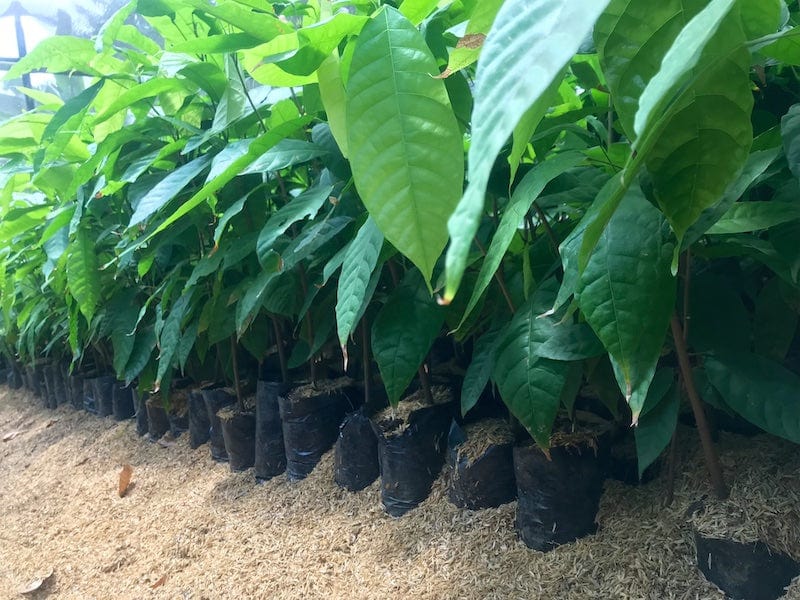
Young theobroma cacao seedlings in the nursery
-
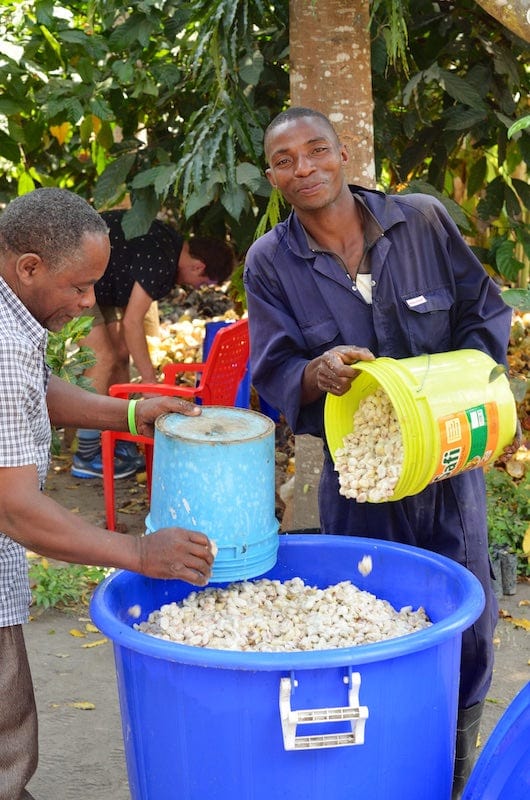
A big bucket of wet cacao ready to begin fermentation
-
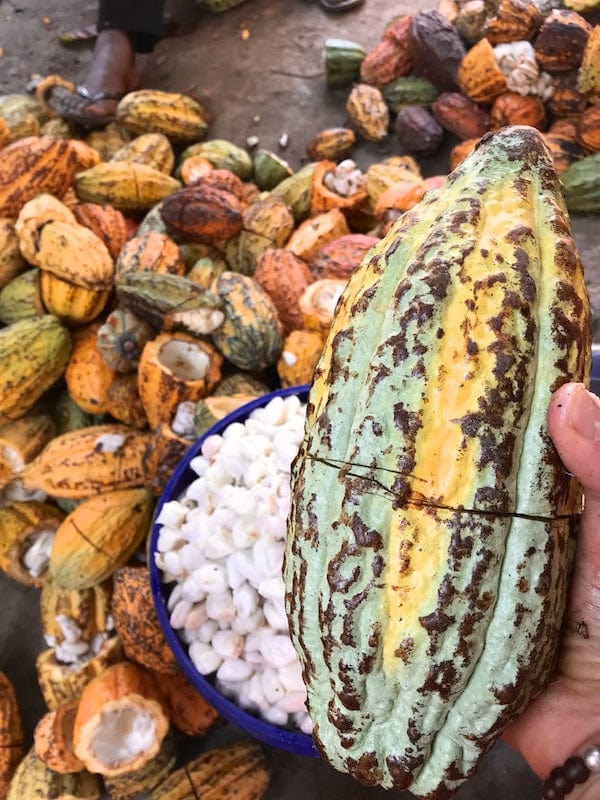
Opening the cacao pods to extract the seeds
-
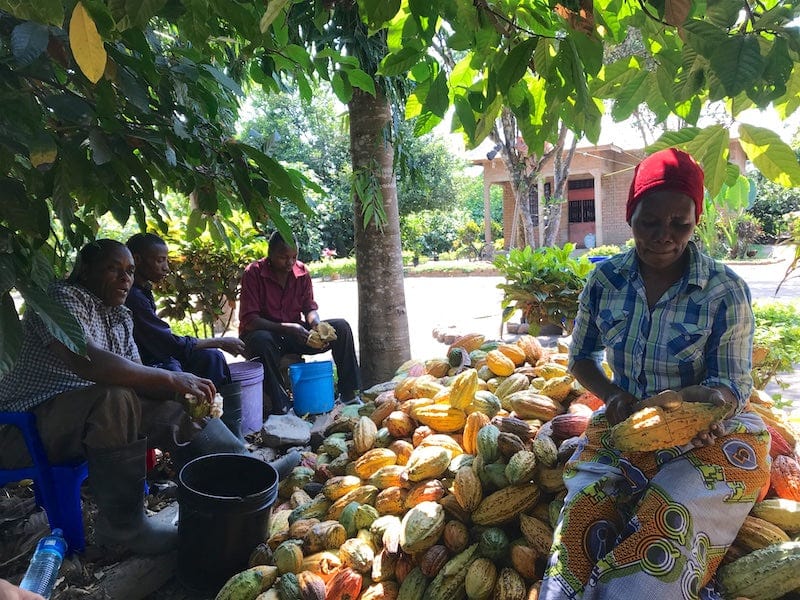
Sarah's farm with a big harvest of ripe cacao pods
Answers to Frequent Health Questions
How Do You Ship?
How Do You Ship?
We ship with insulation and two big ice packs when it's hot out. Additionally 95% of our packages arrive within 1-2 days. That ensures that almost all of our orders arrive safely. All that said, we can't 100% guarantee it arrives without melting, so we would recommend not ordering during a big heat wave and waiting until a cooler week if possible.
What are the Nutrition Facts?
What are the Nutrition Facts?

Is Your Cacao Tested for Heavy Metals?
Is Your Cacao Tested for Heavy Metals?
Yes! We lab test all of our cacaos. Lead is a post harvest contaminant that is introduced into cacao beans through air and soil pollution. Due to our remote sourcing and our stringent post harvest controls, our cacao has very low detectable levels of lead, well below the lead content of other common foods like cinnamon.
All of our cacao also tests well below the regulatory recommendations for cadmium. Cadmium is present in many soils and impacts much of the food system. While cacao has a high concentration of cadmium compared to other grains and vegetables, we eat a relatively small amount of it, so total exposure from cacao is small. Experts estimate that regular ceremonial cacao consumption contributes about 10% of your overall dietary cadmium intake.
Here’s a link to a full discussion on this topic and our test results.
Why are there Rainbow Bubbles in my Cacao?
Why are there Rainbow Bubbles in my Cacao?
All of the following answers are true - pick what works best for you!
1) The cacao senses your awesomeness. Only the blessed few can actually see them, so, you must be awesome.
2) Thin-film interference. Cacao is rich in oils that can spread out in very thin layers on the water-based beverage. The different wavelengths of light have different kinds of interference between the top and bottom surfaces of the oil so white light turns into iridescent rainbows.
3) It's energetic residue from the rainbow serpent that emerged from the first cacao tree a very long time ago (for real - cacao is considered an original world tree in the Maya cosmosvision)
How is this different than cacao powder?
How is this different than cacao powder?
We typically tell our customers that cacao powder has little medicinal or health value because of the following differences:
1) Cacao powder is often made with untraceable, low quality commodity cacao that doesn’t support farmers with ethical compensation. By contrast, Ora sources direct trade traceable to the farmer and with organic certification.
2) This low quality input necessitates processing at very high temperatures, which degrades many of the beneficial compounds in cacao. The process of dutch processing or alkalization to make the flavor milder further reduces the levels of these compounds. By contrast, Ora's premium inputs enable us to use uniquely low temperature processing that keep the value of the cacao bean intact.
3) The cacao bean on it's own is about 50% cacao butter, a healthy natural fat. Pressing for powder strips away most of this fat (reducing it to 10%). However, you want cacao as a whole food, with the cacao butter in it's natural ratio. That's because the fat is an essential carrier for the health benefits of cacao, so without it, many of the health benefits of cacao are unrealized. By contrast, Ora ceremonial cacao has nothing added or removed, so it is a whole food as nature designed it.
Is Cacao A Stiumulant?
Is Cacao A Stiumulant?
We’ve tested our cacao and it has 36 mg of caffeine per 1 oz serving, or about 1/3 of what a regular cup of coffee has. It sounds like a lot, but 1mg of caffeine in cacao is not equivalent to 1mg of caffeine in coffee, because cacao has many other compounds that balance and down-regulate the caffeine.
The primarily stimulant molecule in cacao is actually theobromine. Ora Cacao has 212mg theobromine per 1oz serving. Theobromine is a mild cardiac stimulant, and differs molecularly from caffeine which is a nervous system stimulant. Theobromine gives a long lasting, gentle, embodied energy without any sort of jitters or crash, even for sensitive people. Overall, theobromine is only about one quarter as stimulating as caffeine, and it has a much longer half life in the liver, meaning that it's effect on the body is softer and longer for sustained energy.
Theobromine is also a vasodilator (it relaxes blood vessels), so it has a neutral effect on blood pressure. The improved circulation from cacao is excellent for cardiac health, and improves absorption of the nutrients in cacao and superfoods that it is paired with.
Ceremonial cacao is a great coffee replacement because it offers a grounded energy boost without the jitters and crash. You can fully or partially substitute your cup of coffee with a cup of cacao. If you are new to cacao we recommend drinking it before 2pm so that the stimulant effect has time to clear before you need to sleep.
How Does Cacao Affect Mood?
How Does Cacao Affect Mood?
In the long term, regularly working with ceremonial cacao can have therapeutic health benefits that include creating new neural pathways that change our daily experience to include more joy, love, and connection.
That's because cacao is full of beneficial neurotransmitters and neuro-modulators. It also contains reuptake inhibitors that block the pathways that our bodies normally use to break down and recycle these beneficial mood altering molecules, so the good mood lasts for longer.
Some of the top mood altering molecules in cacao include:
Anandamide is commonly referred to as the bliss molecule, and is associated with the runner’s high effect. It is actually the first endocannabinoid to be discovered, and it is well known for moderating pain. Cacao also has N-linoleoylethanolamine, which is the reuptake inhibitor for anandamide.
Phenylethylamine (PEA) gives the perception of time slowing down, and helps with excitement, alertness, attention.
Norepinephrine is commonly referred to as the joy molecule. It is both a neurotransmitter and a hormone.
Serotonin - Helps with wellbeing, and creates resistance to stress. Cacao contains typtophan, an amino acid that the body converts into serotonin, and cacao contains MOA inhibitors that inhibit re-uptake of serotonin.
Dopamine - Gives feelings of motivation and pleasure. Cacao contains tyrosine, an amino acid that the body converts into dopamine, and cacao contains MOA inhibitors that inhibit re-uptake of dopamine.
Due to these molecules and many others, when you drink ceremonial cacao you may feel expansive, blissful, connected to self and/or others, inspired, connected to your intuition & vision, connected to spirit, grounded, you may have emotions arise, and you may experience the movement of stuck energy. Gives the perception of time slowing down.
What Minerals Does Cacao Have?
What Minerals Does Cacao Have?
Consuming cacao can replenish minerals vital to our body. Magnesium is chronically deficient in the majority of western diets, and cacao is the highest naturally occurring source. Magnesium is used in all key brain functions, especially memory and concentration. It is also beneficial for the function of the heart, acting to relax blood vessels and decrease strain. Besides magnesium, cacao is also the highest naturally occurring source of chromium, and also high in copper, calcium, manganese, zinc, sulfur, iron, and phosphorus.
Are there any Contradindications?
Are there any Contradindications?
Cacao is contraindicated with SSRIs, SNRIs, and NDRIs, which are often prescribed for depression, anxiety, and other mental health conditions. People on these medications may experience headaches and in some cases can develop Serotonin Syndrome, which is critically important to be aware of.
For mild to moderate mental health conditions, cacao offers many of the same benefits of these medications without the side effects of pharmaceuticals so it is a compelling alternative. Many people can reduce their medication intake and have small dosages of ceremonial cacao, safely. There are not sufficient clinical studies on this topic yet and this does not constitute medical advice. Everyone’s neurochemistry is different, so we recommend talking with your physician for proper medical advice.
Besides this, we highly recommend being well hydrated before, during, and after drinking cacao.
Ceremonial Cacao vs Other Cacao Products
| Ceremonial Cacao | Cacao Powder | Baking Chocolate | Raw Cacao Paste | Chocolate Bar | Brewed Cacao | |
|---|---|---|---|---|---|---|
| Premium quality beans |
|
|
|
|
|
|
| No sugar |
|
|
|
|
|
|
| Healthy natural fats |
|
|
|
|
|
|
| Melts into liquid chocolate |
|
|
|
|
|
|
| Healthy natural fats |
|
|
|
|
|
|
| Minimally processed |
|
|
|
|
|
|
| Regenerative agroforestry |
|
|
|
|
|
|
| Ethical, direct trade* |
|
|
|
|
|
|
*Depends on brand, however, almost all cacao is sourced from the commodity cacao market without any traceability.
You May Also Like
-
Boundless Belize
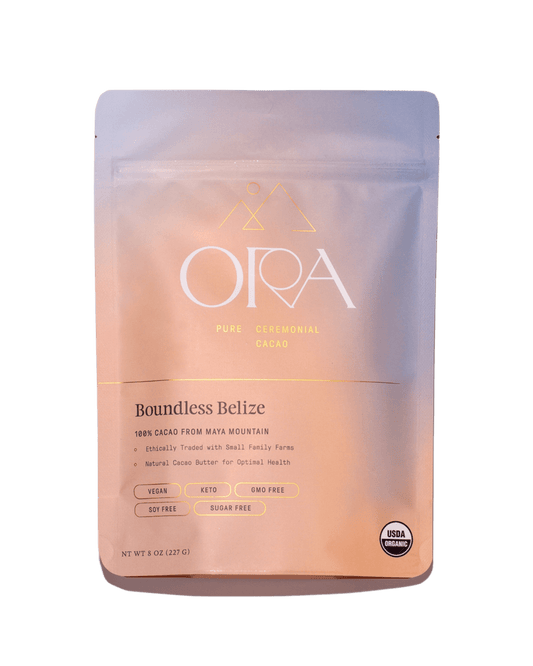
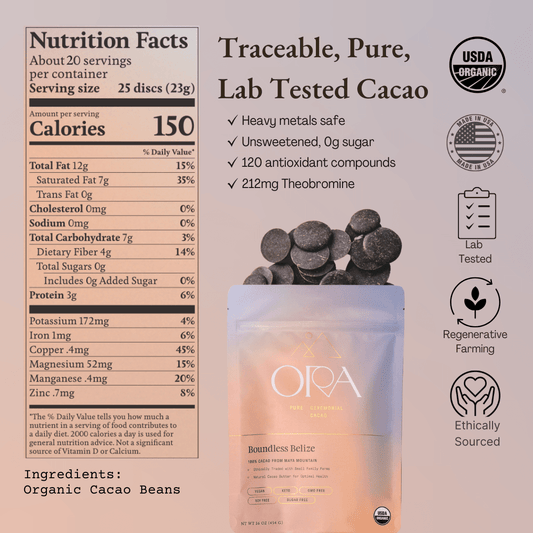 Boundless BelizeRated 4.9 out of 5 stars372 Reviews
Boundless BelizeRated 4.9 out of 5 stars372 Reviews -
Uplifting Uganda
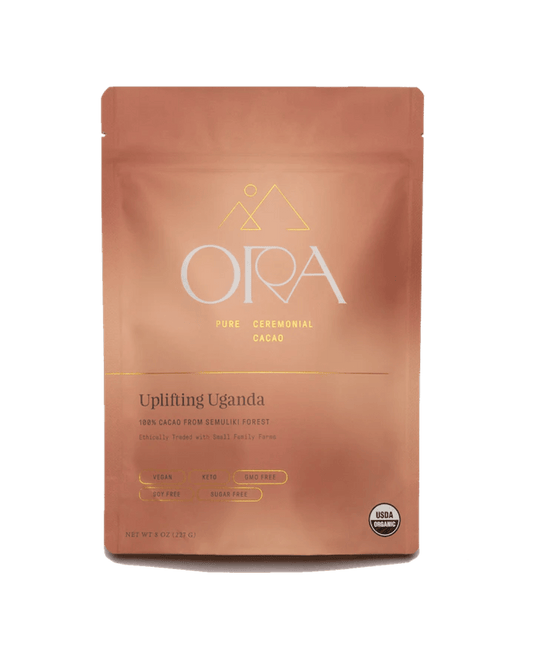
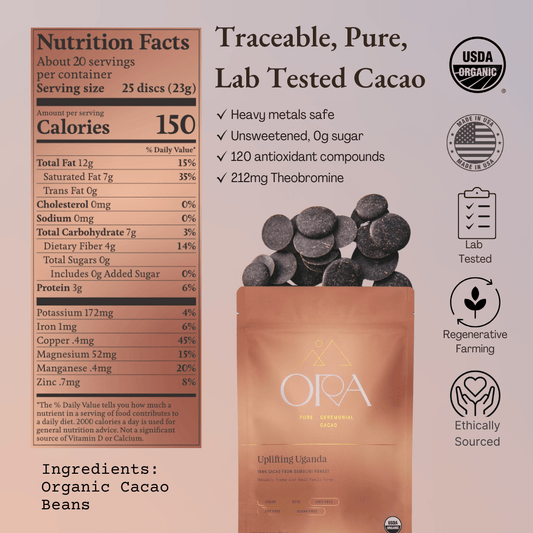 Uplifting UgandaRated 4.9 out of 5 stars372 Reviews
Uplifting UgandaRated 4.9 out of 5 stars372 Reviews -
Glowing Guatemala
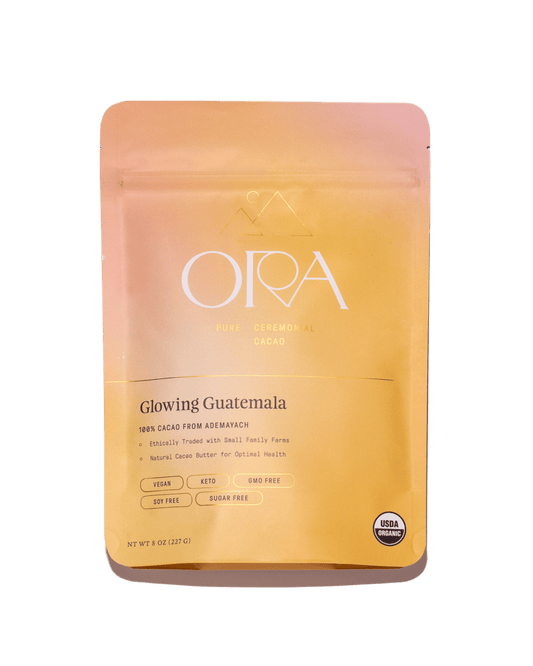
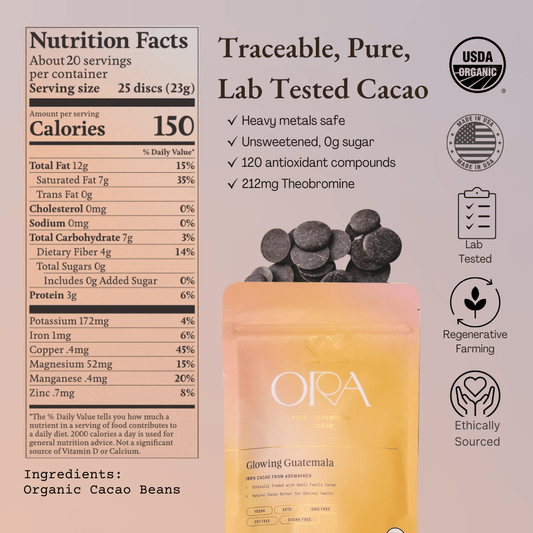 Glowing GuatemalaRated 4.9 out of 5 stars372 Reviews
Glowing GuatemalaRated 4.9 out of 5 stars372 Reviews
Not sure where to start with cacao?
That's okay, you can try them all! Our best selling pure ceremonial cacao kit allows you to try all four of our 100% single origin cacaos!


